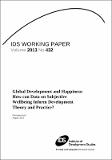Global Development and Happiness: How can Data on Subjective Wellbeing Inform Development Theory and Practice?
Abstract
How can the new science of happiness add value to development theory and practice? While the topic of subjective well-being (SWB, i.e. people’s self-reported life satisfaction and happiness) has recently attracted much attention in rich nations where economic growth over the past 60 years has not led to rises in average happiness, the potential of SWB in a development context remains underexploited. To illustrate one innovative way of using SWB data in such a context and outline their possibilities to the development community, this paper considers conventional development wisdom through a life satisfaction lens. The Human Development approach with its three key elements - material conditions, health and education - is reassessed by examining to what extent these factors actually matter for people’s life satisfaction in different nations. Using Ordinary Least Squares (OLS) regression and data from the World Values Survey (WVS) for about 100,000 people from 70 nations, considerable heterogeneity can be identified regarding the importance of these three factors for the citizens’ SWB across countries. In addition, a ranking is devised on the basis of these results which combines subjective assessments of life satisfaction from the WVS and objective living conditions as measured by the Human Development Index (HDI). As a result, it becomes clear which countries are more successful in generating the goods that truly matter for people’s well-being. The findings of this paper make a case for country specific development goals and strategies that go beyond a one-size-fits-all approach. The results can therefore inform the current debate on how to revise the Millennium Development Goals (MDGs) beyond 2015 and thereby advocate Customised Development Goals (CDGs). Future research should continue to provide more evidence on what are anthropological constants in the determinants of SWB and which variables are culturally relative.
Is part of series
IDS Working Paper;432Rights holder
Instiute of Development StudiesCollections
- IDS Research [1671]

